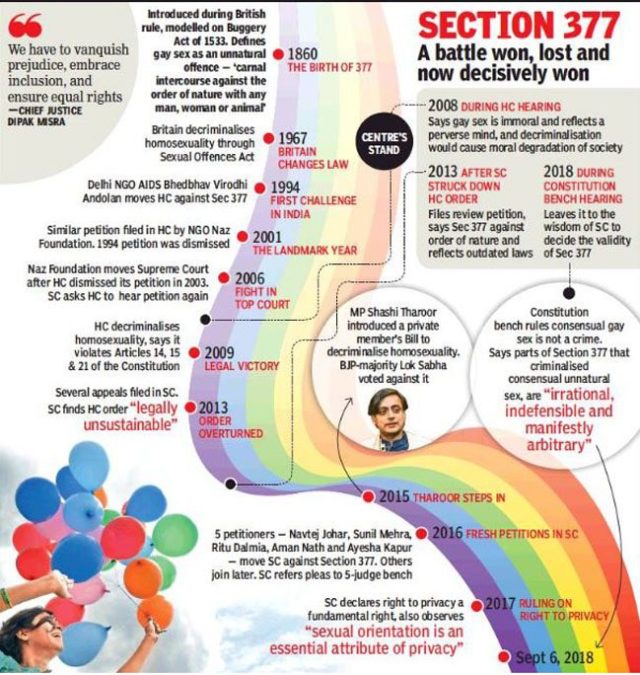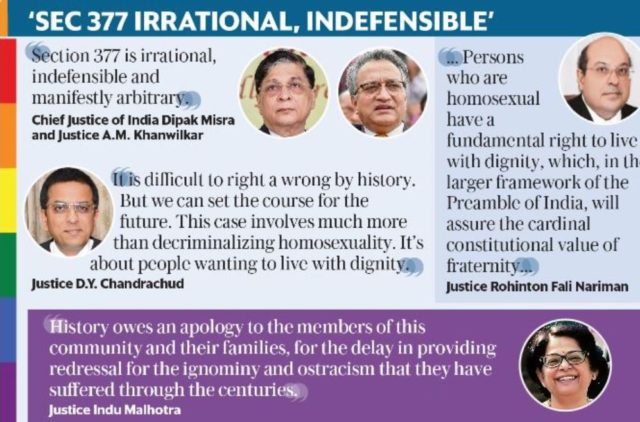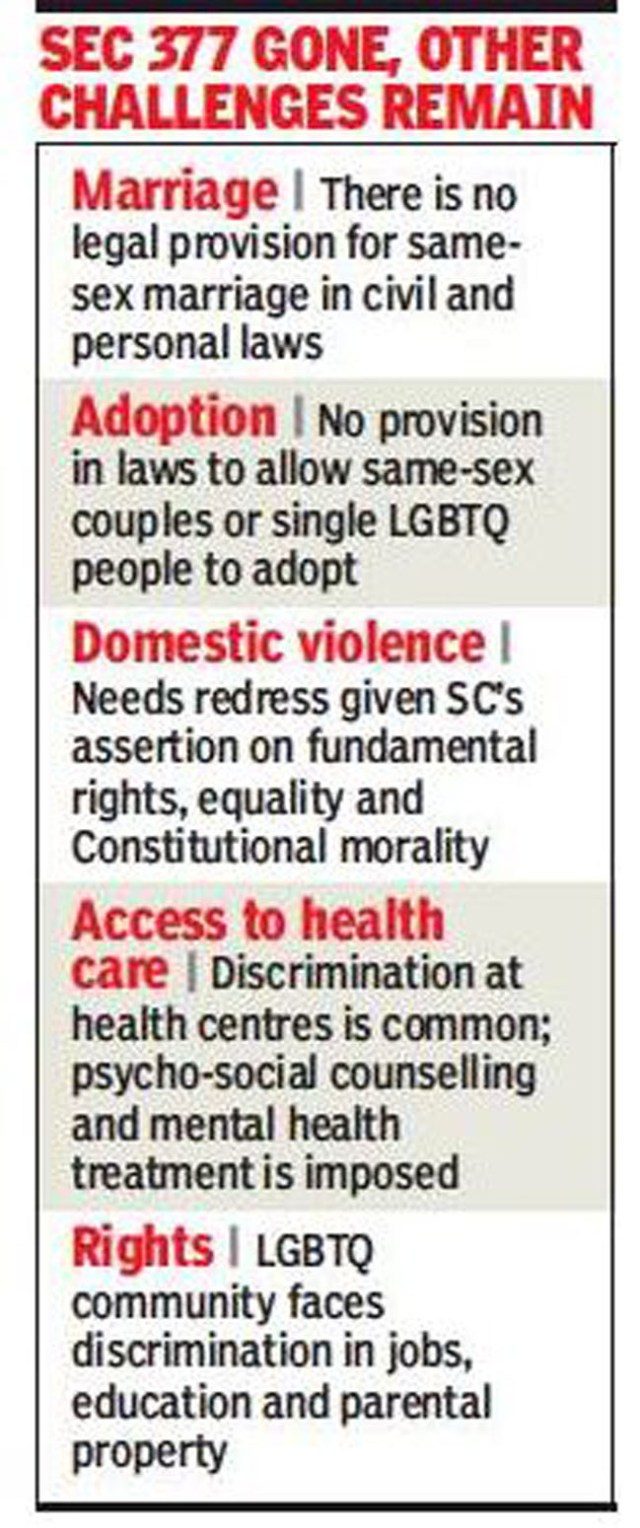PREVIOUS
Indian Penal Code - Section 377
September 19 , 2018
2705 days
12852
0
இந்தக் கட்டுரையினை தமிழில் படிப்பதற்கு - இங்கே சொடுக்கவும்
- Section 377 of the Indian Penal Code criminalizes consensual private sexual acts between adults.
- It came into force in 1862 during the British rule of India.
- Criminal Tribes Act, 1871 was branded a number of marginalized population groups like transgenders as “innately criminal” before it was repealed.
- The 172nd report of the Law Commission of India recommended the deletion of Section 377, but no action was taken.

- The penal provision says “whoever voluntarily has carnal intercourse against the order of nature with any man, woman or animal, shall be punished with imprisonment for life, or with imprisonment of either description for a term which may extend to 10 years, and shall also be liable to fine.”
- The movement to repeal Section 377 was initiated by AIDS Bhedbhav Virodhi Andolan in 1991.
- Their historic publication "Less than Gay: A Citizen's Report", spelt out the problems with 377 and asked for its repeal.
Naz Foundation vs Government of NCT Of Delhi
- The Naz Foundation (India) Trust, an activist group filed a public interest litigation in the Delhi High Court in 2001, seeking legalization of homosexual intercourse between consenting adults.
- In 2003, the Delhi High Court refused to consider a petition regarding the legality of the law, saying that the petitioners, had no locus standiin the matter.
- Naz Foundation appealed to the Supreme Court against the decision of the High Court to dismiss the petition on technical grounds.
- The Supreme Court decided that Naz Foundation had the standing to file a PIL in this case and sent the case back to the Delhi High Court to reconsider it on merit.
- Subsequently, there was a significant intervention in the case by a Delhi-based coalition of LGBT (lesbian, gay, bisexual, and transgender), women's and human rights activists called 'Voices Against 377'.
- This Group supported the demand to 'read down' section 377 to exclude adult consensual sex from within its purview.
- In May 2008, the case came up for hearing in the Delhi High Court, but the Government was undecided on its position.
- The Ministry of Home Affairs maintained a contradictory position to that of The Ministry of Health on the issue of enforcement of Section 377 with respect to homosexuality.
- Eventually, in a historic judgment delivered on 2 July 2009, Delhi High Court overturned the 150-year-old section, legalizing consensual homosexual activities between adults.
- The essence of the section goes against the fundamental right of human citizens, stated the high court while striking it down.
- As per judgment, section 377 of the IPC would violate Article 14 of the Indian constitution, which states that every citizen has equal opportunity of life and is equal before law.
Suresh Kumar Koushal vs. Naz Foundation
- Suresh Kumar Koushal and another some people appealed in supreme court against the Delhi high court verdict.
- In December 2012, the Supreme Court overturned the HC’s decision, after finding it “legally unsustainable.”
- The two-judge bench observed that the HC had overlooked the fact that a “miniscule fraction of the country’s population constitutes LGBT” and that in over 150 years less than 200 people were prosecuted for committing offense under the section.
- The supreme court also left it to Parliament to consider deleting the provision.
- Naz foundation’s further review petition in 2014 was also quashed by the SC.
- After the SC’s verdict, National Crime Records Bureau (NCRB) decided to begin collecting data related to offences under Section 377.
- In 2015, Lok Sabha voted against the introduction of a private member’s Bill to decriminalize homosexuality.
Curative petition to SC
- The petition, filed by well-known LGBTQ activists, claimed their “rights to sexuality, sexual autonomy, choice of sexual partner, life, privacy, dignity, and equality, along with the other fundamental rights guaranteed under Part-III of Constitution, are violated by Section 377.”
- The plea challenging the constitutional validity of Section 377 was the first filed by citizens directly affected by it.
Right to Privacy verdict
- The Supreme Court, in a landmark judgment in August 2017, held Right to Privacy as a fundamental right.

- It also observed that “sexual orientation is an essential attribute of privacy”. It said that the “right to privacy and the protection of sexual orientation lie at the core of the fundamental rights guaranteed by Articles 14, 15 and 21 of the Constitution”.
Navtej Singh Johar vs Union of India
- In 2018, the five-judge constitutional bench of the Supreme Court started hearing the challenge to constitutionality of Section 377.
- The Union Government did not take a position on the issue and left it to the "wisdom of the court" to decide on Section 377.
- The petitioners appealed the right to sexual privacy, dignity, right against discrimination and freedom of expression to argue against the constitutionality of Section 377.
Final Verdict
- On 6 September 2018, the supreme court delivered its verdict, declaring portions of the law relating to consensual sexual acts between adults unconstitutional in a unanimous decision.
- This decision overturns the 2013 ruling in Suresh Kumar Koushal vs. Naz Foundation in which the court upheld the law.

- However, other portions of Section 377 relating to sex with minors, non-consensual sexual acts, and bestiality are to remain in force.

- Thus, India becomes the 125th country to decriminalize homosexuality.
- - - - - - - - - - - - -
Leave a Reply
Your Comment is awaiting moderation.


